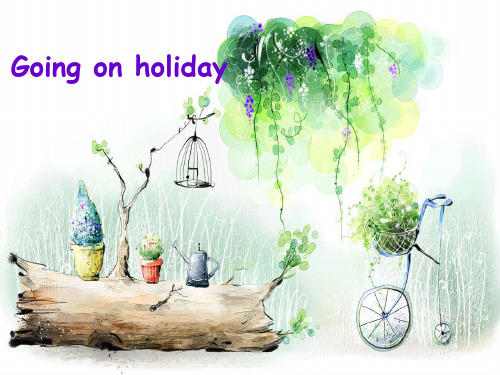新概念英语第一册第83-84课听力:Going on a holiday
- 格式:docx
- 大小:38.09 KB
- 文档页数:3



新概念第⼀册第83-84课重点知识(精)
Lesson83-84 going on holiday去度假Do you want to have lunch with us?你想和我们⼀起吃午餐吗?I have already had lunch.我已经吃过中餐了。
注意这是新的知识点---现在完成时:⽤法是have+动词的过去分词(不是过去式表⽰的意思是已经。
(并且对现状造成了影响 Already这个单词意思就是已经,是现在完成时的时间标志。
例如I have already had my holiday this year.今年我已经去度假过了。
I have just had a cup of coffee我刚刚已经喝了⼀杯咖啡。
注意这句话也是现在完成时,just表⽰刚刚,Let's go into the living room.让我们⼀起到客厅去吧。
This rom is very untidy. untidy表⽰不整洁的,We're packing our suitcases.我们正在收拾打包⾏李。
We're going to have a holiday.我们要去度假啦!最后记住三个单词lucky幸运的,unlucky不幸运的,mess杂乱、凌乱。



新概念一Lesson 83-84 课内语法一、单词:拼读、过关、讲解1.mess in a mess⑴杂乱,混乱⑵陷入困境/make a mess of 使(工作、计划等)成一团糟eg;Excuse the mess.房子很乱,请原谅。
2.pack n.小包:a pack of cigarettes一包香烟 vt.&vi.打包,装箱:We are packing our suitcases. 我们正在收拾手提箱3.suitcase 手提箱 briefcase公文包;trunk结实的大衣箱4.leave vt.离开,舍弃:We are going to leave tomorrow. 我们打算明天走留下;忘带:He left his book in the garden.他把书忘在花园里了。
leave for 动身到(某处) leave n.假;假期:ask for leave请假5.already 已经:I have already had my holiday this year.二、课文:领读、句子过关、讲解1.进来 come in2.have lunch (with sb.)和……吃饭3.at用于时间点前4.一杯咖啡 a cup of coffee5.living room客厅6.乱七八糟,请原谅 excuse the mess7.打算,准备 be going to8.度假 have a holiday=go on holiday9.Are' t you lucky!你们真幸运! 10.呆在家 stay at home11.suitcase (复数) suitcases; housewife (复数)housewives ; milkman(复数)milkmen12.让某人做某事 let sb do sth三、语法㈠现在完成时⑴在英语中,现在完成时主要用于以下两种情况:或者表示在过去不确定的时间里发生的并与现在有着某种联系的动作;或者表示开始于过去并持续到现在的动作。
新概念英语第一册课后题及答案:Lesson83-84.doc新概念英语第一册课后题及答案:Lesson83-84 Written exercises 书面练习A Write responses using some or one.模仿例句写出对应的回答,选用some或one。
Examples:Have some coffee. I've already had some.Have a banana. I've already had one.1 Have some beer.2 Have an apple.3 Have a peach.4 Have some milk.5 Have a glass of water.6 Have a biscuit.7 Have some cheese.B Answer these questions.模仿例句回答以下问题。
Example:Have you had any vegetables or fruit? (I)I haven't had any vegetables.I've just had same fruit.1 Has he had any beans or peas? (He)2 Have they had any tea or coffee? (They)3 Have you had any apples or peaches? (I)4 Have you had any cabbage or lettuce? (I)5 Has she had any beer or wine? (She)6 Has he had any lamb or beef? (He)7 Have they had any tea or milk? (They)8 Has she had any meat or vegetables? (She)9 Have you had any chicken or steak? (I)10 Have they had any bananas or oranges? (They)答案:Lesson 84A1 I've already had some.2 I've already had one.3 I've already had one.4 I've already had some.5 I've already had one.6 I've already had one.7 I've already had some.B1 He hasn't had any beans. He's just had some peas.2 They haven't had any tea. They've just had some coffee.3 I haven't had any apples. I've just had some peaches.4 I haven't had any cabbage. I've just had some lettuce.5 She hasn't had any beer. She's just had some wine.6 He hasn't had any lamb. He's just had some beef.7 They haven't had any tea. They've just had some milk.8 She hasn't had any meat. She's just had some vegetables.9 I haven't had any chicken. I've just had some steak.10 They haven't had any bananas. They've just had some oranges.。
新概念英语第一册第83-84课:Going on a holiday Lesson 83 Going on holiday度假Listen to the tape then answer this question.Where did Sam go for his holiday this year?听录音,然后回答下列问题。
今年萨姆去了什么地度假?Caeol: Hello, Sam. Come in.卡罗尔:你好,萨姆。
进来吧。
Tom: Hello, Sam. Were having lunch. Do you want to have lunch with us?汤姆:你好,萨姆。
我们正在吃午饭,你跟我们一起吃午饭好吗?Sam: No thank you, Tom. Ive already had lunch. I had lunch at half past twelve.萨姆:不,汤姆,感谢。
我已经吃过饭了。
我在12点半吃的。
Caeol: Have a cup of coffee then.卡罗尔:那么喝杯咖啡吧。
Sam: Ive just had a cup, thank you. I had one after my lunch.萨姆:我刚喝了一杯,感谢。
我是在饭后喝的。
Tom: Lets go into the living-room, Caeol. We can have our coffee there.汤姆:我们到客厅里去吧,卡罗尔。
我们可以在那里喝咖啡。
Caeol: Excuse the mess, Sam. This rooms very untidy. Were packing our suitcases. Were going to leave tomorrow. Tom and I are going to have a holiday.卡罗尔:屋子很乱,请谅解,萨姆。
新概念英语第一册第83-84课听力:Going on a
holiday
Lesson 83 Going on holiday度假
Listen to the tape then answer this question.Where did Sam go for his holiday this year?
听录音,然后回答问题。
今年萨姆去了什么地度假?
Caeol: Hello, Sam. Come in.
卡罗尔:你好,萨姆。
进来吧。
Tom:Hello, Sam. We’re having lunch. Do you want to
have lunch with us?
汤姆:你好,萨姆。
我们正在吃午饭,你跟我们一起吃午饭好吗?
Sam:No thank you, Tom. I’ve already had lunch. I had lunch at half past twelve.
萨姆:不,汤姆,谢谢。
我已经吃过饭了。
我在12点半吃的。
Caeol: Have a cup of coffee then.
卡罗尔:那么喝杯咖啡吧。
Sam:I’ve just had a cup, thank you. I had one after my lunch.
萨姆:我刚喝了一杯,谢谢。
我是在饭后喝的。
Tom:Let’s go into the living-room, Caeol. We can have our coffee there.
汤姆:我们到客厅里去吧,卡罗尔。
我们能够在那里喝咖啡。
Caeol: Excuse the mess, Sam. This room’s very untidy. We’re packing our suitcases. We’re going to leave tomorrow. Tom and I are going to have a holiday.
卡罗尔:屋子很乱,请原谅,萨姆。
我们正在收拾手提箱。
明天我们就要走了。
我和汤姆准备去度假。
Sam:Aren’t you lucky!
萨姆:你们真幸运!
Tom: When are you going to have a holiday, Sam?
汤姆:萨姆,你准备什么时候去度假?
Sam:I don’t know. I’ve already had my holiday this year.
萨姆:我不知道。
今年我已度过假了。
Caeol: Where did you go?
卡罗尔:你去哪儿了?
Sam: I stayed at home!
萨姆:我呆在家里了!
New words and Expressions生词和短语
mess
n. 杂乱,凌乱
pack
v. 包装,打包,装箱
suitcase
n. 手提箱
leave
v. 离开
already
adv. 已经
Notes on the text课文注释
1 在英语中,现在完成时主要用于以下两种情况:(1)表示在过去
不确定的时间里发生的并与现在有着某种联系的动作:(2)表示开始于
过去并持续到现在的动作。
本课中萨姆的3句话属于第一种情况,正
是因为他吃了饭、喝过了咖啡、也休过假,所以他谢绝了汤姆的邀请,并表示今年已无可能再次休假。
现在完成时是由have的现在式加上过
去分词组成。
规则动词的过去分词与过去式相同,而不规则动词的过
去分词则无统一的规律可言。
从本课起不规则动词还将列出过去分词
的拼写和读音。
2 I've already had lunch.注意already的语序。
在一般情况下,它跟在助动词后面。
3 Excuse the mess.意思是:“乱七八糟,请原谅。
”
4 have a holiday,度假。
have在不同词组中,意思不同。
如:have lunch,吃午饭:have
a cup of coffee,喝杯咖啡。
5 stay at home,呆在家里.注意名词home之前不加任何冠词。
在诸如go home, arrive home 的短语中,home是副词。